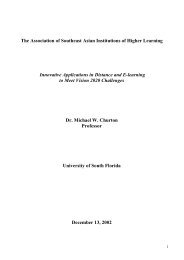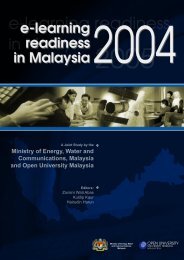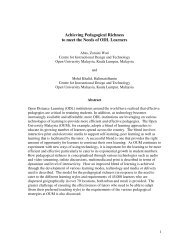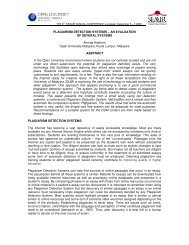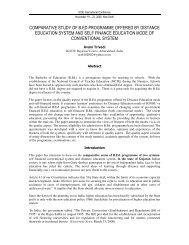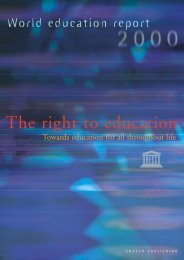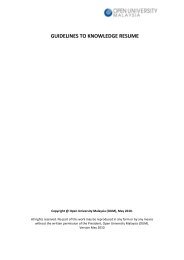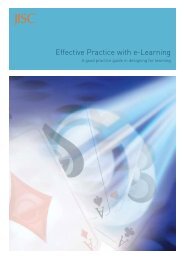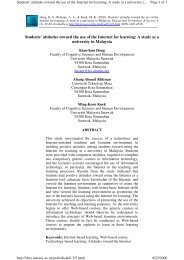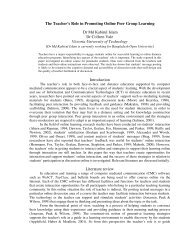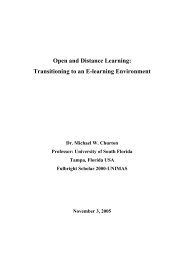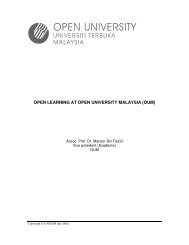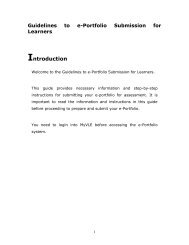lifelong learning and distance higher education - Asia Pacific Region
lifelong learning and distance higher education - Asia Pacific Region
lifelong learning and distance higher education - Asia Pacific Region
- No tags were found...
Create successful ePaper yourself
Turn your PDF publications into a flip-book with our unique Google optimized e-Paper software.
Adopting national QA framework for HEOther countries adopt the QA system for <strong>higher</strong> <strong>education</strong> (HE) to oversee <strong>and</strong> monitorthe quality of DE institutions. OUUK’s QA system is closely linked to the nationalQA framework for universities <strong>and</strong> colleges. OUUK is subject to at least three formsof external assessment undertaken by the Funding Councils <strong>and</strong> the Quality AssuranceAgency for Higher Education. Three kinds include assessments of: 1) subjects orteaching, 2) research, <strong>and</strong> 3) institutional performance <strong>and</strong> management. The first twoare undertaken by the Funding Council for Engl<strong>and</strong>, the last by the Quality AssuranceAgency for Higher Education.UT programmes are accredited by the National Accreditation Board of Higher Education<strong>and</strong> have been assessed by the Directorate General of Higher Education using the “QAGuideline for Higher Education”. In the near future, however, a new “GovernmentRegulation on Distance Education” will be established <strong>and</strong> applied to the assessment of<strong>distance</strong> <strong>education</strong> programmes in Indonesia.Other <strong>distance</strong> teaching universities such as CCRTVU, SHTVU, STOU <strong>and</strong> KNOU arealso evaluated by the national QA body for HE. Separate evaluation criteria for assessingthe quality of DE have not been reported in these cases.Complying with international QA frameworkBesides a close link to the national QA framework, UT is developing QA systems to acquireISO certification. UT is also in the process of seeking international accreditation <strong>and</strong> qualitycertification from the International Council for Open <strong>and</strong> Distance Education (ICDE).CONCLUSIONA quality culture can be defined as an institutional culture that promotes theintroduction of an internal QA system, values the capacity building for implementingQA arrangements, stresses the link between the internal QA system <strong>and</strong> accountabilityto the public at the national <strong>and</strong> international levels, <strong>and</strong> focuses on <strong>learning</strong> ratherthan teaching. The survey results show that a quality culture has been emerging, if notfully integrated, in the mega universities investigated. All the mega universities havedeveloped <strong>and</strong> implemented QA st<strong>and</strong>ards <strong>and</strong> procedures in key areas of <strong>distance</strong><strong>education</strong> activities <strong>and</strong> at least four mega universities surveyed have institutionaliseda central QA unit <strong>and</strong> thus sought the development of a more systematic <strong>and</strong> coherentquality culture. Another indicator for the emergence of a quality culture is capacitybuilding efforts made by the institutions. At least half of the mega universities haveprovided continuous staff development opportunities to their academic <strong>and</strong> administrativestaff in pursuit of quality improvement. It is found that international organisations suchas UNESCO, COL, OECD <strong>and</strong> World Bank have provided useful QA guidelines <strong>and</strong>resources for <strong>distance</strong> educators. Moreover, most of the institutions have shown anaspiration of obtaining national recognition as a high quality DE provider. Some havegone beyond national level accreditation <strong>and</strong> recognition <strong>and</strong> pursued internationalrecognition such as ISO certification for their services.The survey also shows that there exists a variety of QA systems of <strong>distance</strong> <strong>education</strong>even though the globalisation <strong>and</strong> competitiveness of <strong>higher</strong> <strong>education</strong> <strong>and</strong> thedevelopment of technology have brought <strong>distance</strong> teaching universities closer togetherin terms of developing a common quality culture. The level of QA policy integrationin an overall university policy framework varies across the mega universities. Some90



